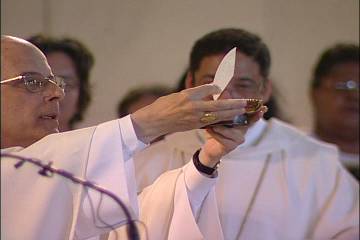Since the earliest times, the benefits of receiving the Body and Blood of Christ were spelled out to encourage frequent, even daily, Holy Communion.
Thus, St. Cyril of Jerusalem (died 387) said that reception of the Eucharist makes the Christian a "Christbearer" and "one body and one blood with Him" (Catecheses, 4,3). St. John Chrysostom (died 407) speaks of a mixing of the Body of Christ with our body, "…in order to show the great love that He has for us. He mixed Himself with us, and joined His Body with us, so that we might become one like a bread connected with the body" (Homily 46,3). These and other comparisons of how Communion unites the recipient with Christ are based on Christ's own teaching, and St. Paul's statement that, "the bread which we break, is it not the partaking of the Body of the Lord? For we, being many, are one bread, all that partake of this bread." (I Corinthians 10:16-17).
So, too, the church officially teaches that "Every effect which bodily food and bodily drink produce in our corporeal life, by preserving this life, increasing this life, healing this life, and satisfying this life - is also produced by this Sacrament in the spiritual life" (Council of Florence, November 22, 1439). Thus:
1. Holy Communion preserves the supernatural life of the soul by giving the communicant supernatural strength to resist temptation, and by weakening the power of concupiscence. It reinforces the ability of our free will to withstand the assaults of the devil. In a formal definition, the Church calls Holy Communion "an antidote by which we are preserved from grievous sins" (Council of Trent, October 11, 1551).On Christ's own promise, Holy Communion is a pledge of heavenly glory and of our bodily resurrection from the dead (John 6:55). St. Irenaeus (died 202) simply declared that, "when our bodies partake of the Eucharist, they are no longer corruptible as they have the hope of eternal resurrection" (Against the Heresies, IV, 18,5).
2. Holy Communion increases the life of grace already present by vitalizing our supernatural life and strengthening the virtues and gifts of the Holy Spirit we possess. To be emphasized, however, is that the main effect of Communion is not to remit sin. In fact, a person in conscious mortal sin commits a sacrilege by going to Communion.
3. Holy Communion cures the spiritual diseases of the soul by cleansing it of venial sins and the temporal punishment due to sin. No less than serving as an antidote to protect the soul from mortal sins, Communion is "an antidote by which we are freed from our daily venial sins" (Council of Trent, October 11, 1551). The remission of venial sins and of the temporal sufferings due to sin takes place immediately by reason of the acts of perfect love of God, which are awakened by the reception of the Eucharist. The extent of this remission depends on the intensity of our charity when receiving Communion.
4. Holy Communion gives us a spiritual joy in the service of Christ, in defending His cause, in performing the duties of our state of life, and in making the sacrifices required of us in imitating the life of our Savior.
Pocket Catholic Catechism, John A. Hardon, S.J., An Image Book, Published by Doubleday
Copyright © 1989 by John A. Hardon, All Rights Reserved



No comments:
Post a Comment